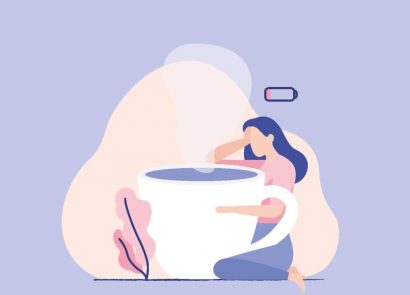It’s Wednesday morning and last night’s bootcamp is making an unwelcome comeback in every muscle it takes to roll out of bed and into the sportswear calling from your bag. Or not.
Over-training is just one of the justifiable reasons to opt out of your workout and enjoy that Egyptian cotton a little longer. Although you get gold stars for your dedication, research has shown that consistently pushing your body to the limit can lead to a host of medical weaknesses that may not be as easy to fix as a cup of tea and an early night. So sit back, relax and reap the benefits of a little r and r.
Q
I’m on a roll, why should i stop?
A
When you have a good run (excuse the pun) of personal bests and boundless energy, it can be frustrating to take a day or two off. But the reality is that over-training can result in hormonal, nutritional, mental, muscular and neurological imbalances. The most common consequence is adrenal fatigue caused by continuous over-stimulation of the adrenal glands from physical or emotional stress which can lead to chronic exhaustion. “Scheduling rest and regeneration is one of the biggest components people neglect for achieving a healthy, strong, lean and balanced body,” says Lee Mullins, personal trainer and founder of Workshop (workshopgymnasium.com). “Everything has to be in balance, like yin and yang. Most of us have plenty of the yang activities such as working out and keeping active, but don’t balance it out with yin such as rest days, stretching or anything else that is restorative.”
Q
Surely i can just take it easy, right?
A
While a rest day may seem like you’re slacking, time off actually allows your progress to grow. “How inactive you are on your days off depends on the intensity you usually train,” Lee tells us. “If you’re killing it in the gym more than three times a week, it’s best to stop altogether on your rest day. Instead, get a massage, enjoy a hot bath and lay-in. However, if it’s usually moderate exercise, your rest days can still be active but low intensity. Think yoga class, casual walk or 20-minute jog to keep things ticking over. Don’t forget that any activity should also help your mind take a break,” Lee explains.
Q
What happens if i carry on training?
A
You’re feeling a little tired but could easily work out – so surely this doesn’t apply to you, right? “Potentially you could be doing more harm than good by pushing yourself no matter what,” Lee warns. “When you’re fatigued or under the weather, it may seem do-able but your immune system is weaker, which will make it slower to recover from training sessions and can increase your risk of injury by weakening connective tissue. This isn’t to say you should stop moving, you should still aim to be active by moving and walking as much as you can, but you may want to avoid high intensity exercise.”
Q
I feel guilty skipping my workout
A
Although dedication to a fitness goal is a vital motivator, powering through can be detrimental to the end result. “To get over the fear and disappointment of resting, it’s important to believe that resting isn’t a bad thing, in fact it’s essential to keep progressing. There’s a reason professional athletes have planned rest days in their training schedules – it’s to ensure they continue to get quicker, stronger and leaner while reducing the risk of injury. Remember that your body doesn’t lose fat or get stronger when you’re at the gym – it happens when you rest and recover. Life is long and exercising is something that should have longevity,” Lee explains.
Q
Ok, how often should i rest?
A
To get the best out of your body, make sure you listen to what it’s telling you. Although persevering after a long day or through a niggling headache may, at times, help rather than hinder, pushing the boundaries may be a step too far. “If you are a complete beginner to exercise and starting out on a training programme, I would suggest having a rest day every other day for the next two to four weeks so that you exercise one day, then rest the next, and continue this 1:1 ratio,” Lee suggests. “Then develop to a 2:1 or a 3:1 ratio. The quality of your rest will be determined by whether you’re getting enough good quality sleep and eating enough whole, clean, fresh foods to aid your body in its recovery.”
Downtime diagnosis
If that Crossfit class is calling, Lee gives us some handy hints to speed up recovery and get you back on your feet:
Tired
If you have to drag yourself out of bed, it’s a sign that you may be suffering from adrenal fatigue. Aim to get to bed by 10pm, and drink yerba mate tea and a glass of water with Himalayan salt and squeeze of lemon in the morning to restore your adrenal glands. Low intensity exercise such as gentle bike ride, a fast paced walk or swimming are fine as they won’t fatigue your nervous system.
Weak
If you begin to notice that your performance and strength in the gym isn’t improving or is even decreasing, it’s time to take a break. Instead of working out, do something restorative. These include deep tissue massage, yoga, reflexology and acupuncture.
Busy
Nowadays our lives are busier than ever, but everyone can take 10 minutes in the day to stretch or do some foam rolling. You might not have time to stretch the whole body, so pick an area that lacks mobility (it’s likely to be your ankles) and spend a few minutes stretching.
Injured
Training around an injury can lead to faulty movement patterns, muscle imbalances and soft tissue injuries. Instead, keep moving without causing pain to the injured area such as walking up and down a swimming pool, going for a gentle walk around the park, or 10-15 minutes of static stretching at home.
Ill
Rest up, get plenty of sleep and boost your immune system with foods rich in vitamin A such as sweet potatoes, carrots, squash and pumpkin. Ditch the gym for a walk around the park – the fresh air will help to boost your vitamin D.





















